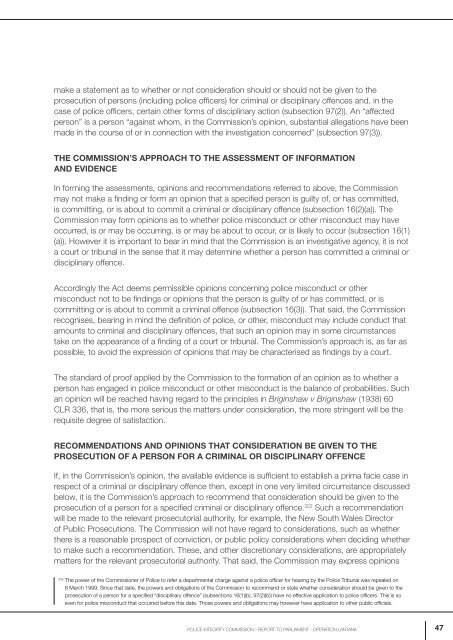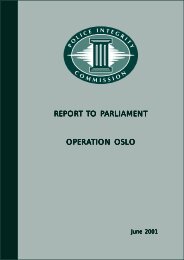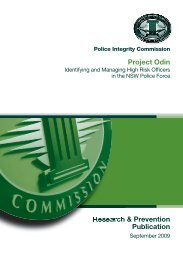Operation Lantana - Police Integrity Commission
Operation Lantana - Police Integrity Commission
Operation Lantana - Police Integrity Commission
You also want an ePaper? Increase the reach of your titles
YUMPU automatically turns print PDFs into web optimized ePapers that Google loves.
make a statement as to whether or not consideration should or should not be given to the<br />
prosecution of persons (including police officers) for criminal or disciplinary offences and, in the<br />
case of police officers, certain other forms of disciplinary action (subsection 97(2)). An “affected<br />
person” is a person “against whom, in the <strong>Commission</strong>’s opinion, substantial allegations have been<br />
made in the course of or in connection with the investigation concerned” (subsection 97(3)).<br />
ThE COMMISSION’S APPROACh TO ThE ASSESSMENT Of INfORMATION<br />
AND EVIDENCE<br />
In forming the assessments, opinions and recommendations referred to above, the <strong>Commission</strong><br />
may not make a finding or form an opinion that a specified person is guilty of, or has committed,<br />
is committing, or is about to commit a criminal or disciplinary offence (subsection 16(2)(a)). The<br />
<strong>Commission</strong> may form opinions as to whether police misconduct or other misconduct may have<br />
occurred, is or may be occurring, is or may be about to occur, or is likely to occur (subsection 16(1)<br />
(a)). However it is important to bear in mind that the <strong>Commission</strong> is an investigative agency, it is not<br />
a court or tribunal in the sense that it may determine whether a person has committed a criminal or<br />
disciplinary offence.<br />
Accordingly the Act deems permissible opinions concerning police misconduct or other<br />
misconduct not to be findings or opinions that the person is guilty of or has committed, or is<br />
committing or is about to commit a criminal offence (subsection 16(3)). That said, the <strong>Commission</strong><br />
recognises, bearing in mind the definition of police, or other, misconduct may include conduct that<br />
amounts to criminal and disciplinary offences, that such an opinion may in some circumstances<br />
take on the appearance of a finding of a court or tribunal. The <strong>Commission</strong>’s approach is, as far as<br />
possible, to avoid the expression of opinions that may be characterised as findings by a court.<br />
The standard of proof applied by the <strong>Commission</strong> to the formation of an opinion as to whether a<br />
person has engaged in police misconduct or other misconduct is the balance of probabilities. Such<br />
an opinion will be reached having regard to the principles in Briginshaw v Briginshaw (1938) 60<br />
CLR 336, that is, the more serious the matters under consideration, the more stringent will be the<br />
requisite degree of satisfaction.<br />
RECOMMENDATIONS AND OPINIONS ThAT CONSIDERATION BE GIVEN TO ThE<br />
PROSECUTION Of A PERSON fOR A CRIMINAL OR DISCIPLINARY OffENCE<br />
If, in the <strong>Commission</strong>’s opinion, the available evidence is sufficient to establish a prima facie case in<br />
respect of a criminal or disciplinary offence then, except in one very limited circumstance discussed<br />
below, it is the <strong>Commission</strong>’s approach to recommend that consideration should be given to the<br />
prosecution of a person for a specified criminal or disciplinary offence. 322 Such a recommendation<br />
will be made to the relevant prosecutorial authority, for example, the New South Wales Director<br />
of Public Prosecutions. The <strong>Commission</strong> will not have regard to considerations, such as whether<br />
there is a reasonable prospect of conviction, or public policy considerations when deciding whether<br />
to make such a recommendation. These, and other discretionary considerations, are appropriately<br />
matters for the relevant prosecutorial authority. That said, the <strong>Commission</strong> may express opinions<br />
322 The power of the <strong>Commission</strong>er of <strong>Police</strong> to refer a departmental charge against a police officer for hearing by the <strong>Police</strong> Tribunal was repealed on<br />
8 March 1999. Since that date, the powers and obligations of the <strong>Commission</strong> to recommend or state whether consideration should be given to the<br />
prosecution of a person for a specified “disciplinary offence” (subsections 16(1)(b), 97(2)(b)) have no effective application to police officers. This is so<br />
even for police misconduct that occurred before this date. Those powers and obligations may however have application to other public officials.<br />
POLICE INTEGRITY COMMISSION – REPORT TO PARLIAMENT - OPERATION LANTANA<br />
47




